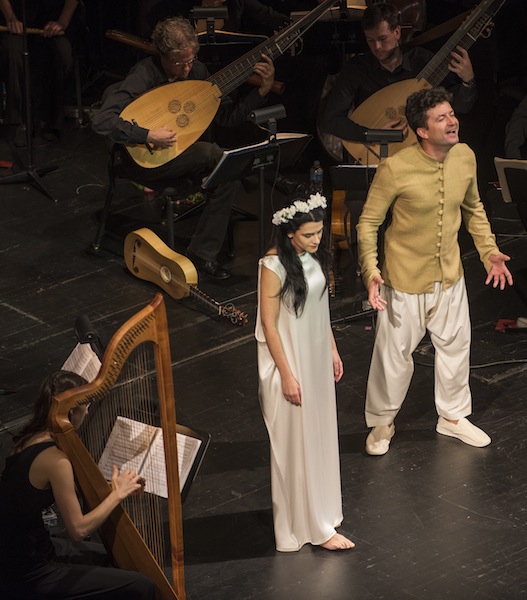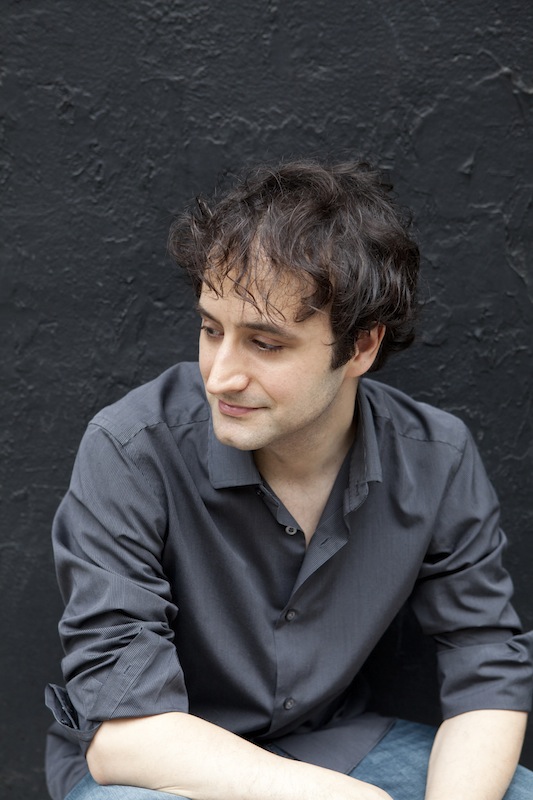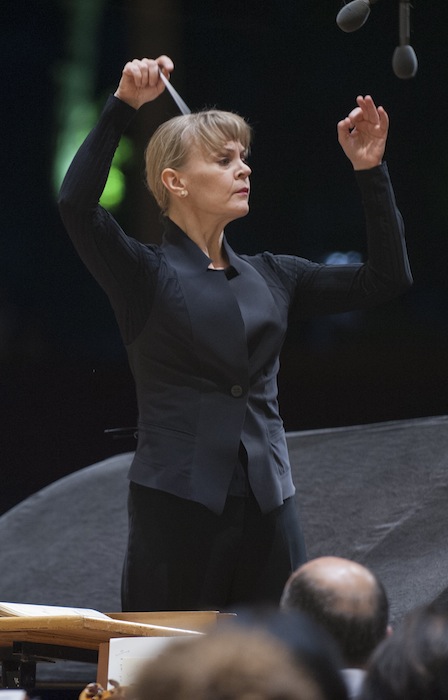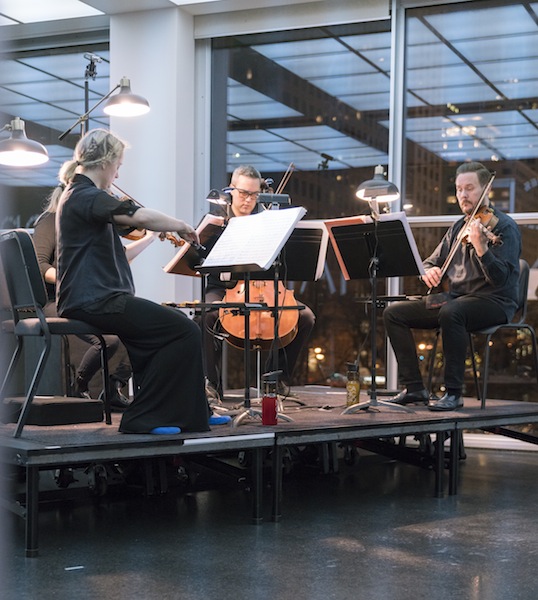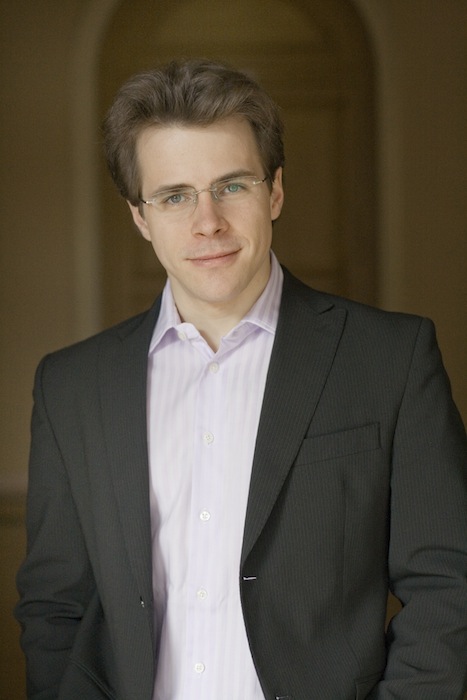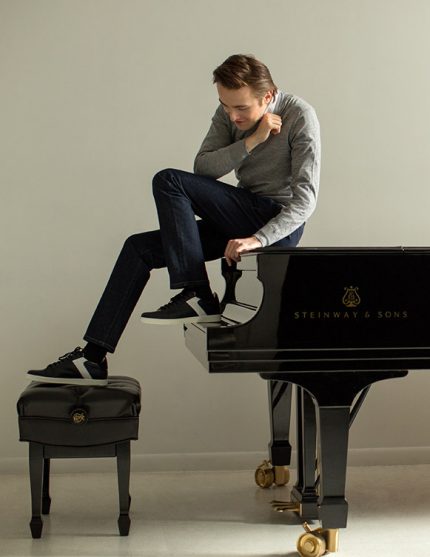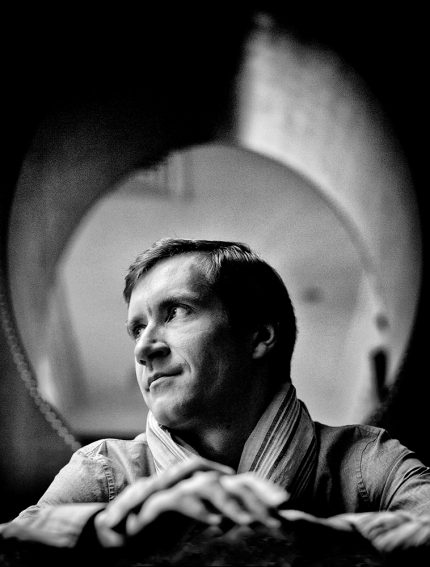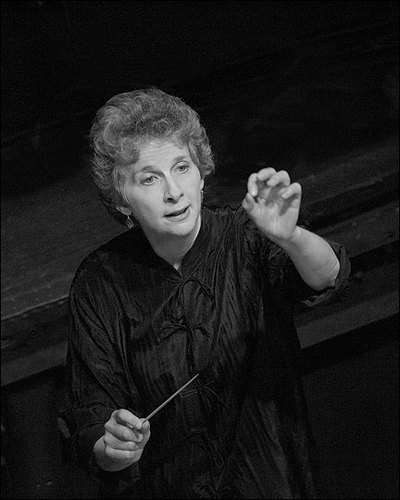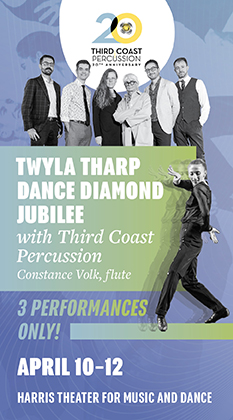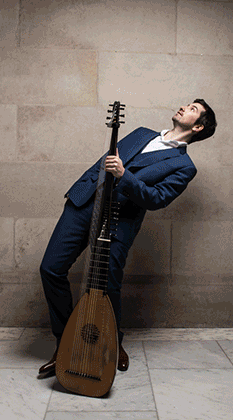Top Ten Performances of 2017
The Harris Theater pulled off the booking coup of the year by nabbing John Eliot Gardiner and his Monteverdi Choir and English Baroque Soloists for one of only two U.S. stops on Gardiner’s international tour marking Claudio Monteverdi’s 450th birthday anniversary. In ingeniously staged concert versions of all three of the Italian composer’s surviving operas–L’Orfeo, l Ritorno d’Ulisse in Patria and L’Incoronazione di Poppea–Gardiner led a terrific lineup of solo singers, his chorus and orchestral forces in revelatory performances that seemed as natural and inevitable as breathing. Gardiner and colleagues displayed total identification and seamless mastery of Monteverdi’s elusive style, bringing out the operas’ varied richness, startling originality, and deep humanity, playing and singing this sublime music with complete sympathy, understanding and love.
The Harris Theater’s “Monteverdi 450” cycle was easily the top musical event of 2017–and of recent years as well.
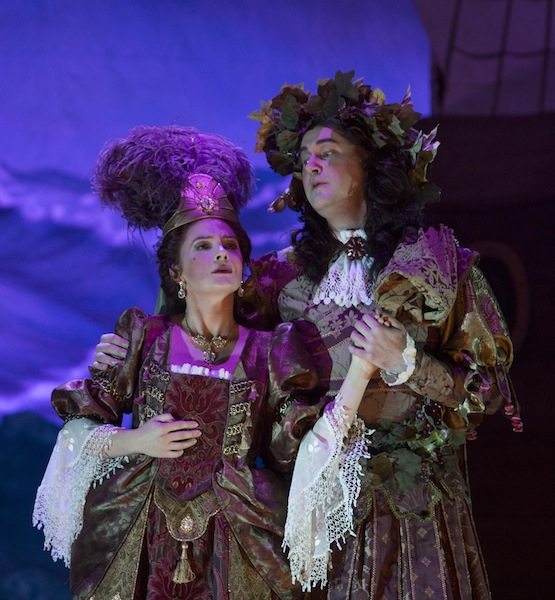
2. Haymarket Opera. Marin Marais’s Ariane et Bachus.
Since its founding in 2011, Haymarket Opera has been serving up yeoman advocacy on behalf of Baroque opera. In September the company presented its most ambitious event yet with delightful results. Excavating Marin Marais’s long-lost Ariane et Bachus, Haymarket presented the opera’s first performance in centuries in Silvana Scarinci’s brand new performing edition. With a superb cast of singers and presented in its new downtown home, the renovated Studebaker Theater, Haymarket Opera’s Ariane et Bachus was magical, visually sumptuous, and wholly beguiling.
3. Ran Dank. Frederic Rzewski’s The People United Will Never Be Defeated! at Mandel Hall.
When the pianist who was originally scheduled to perform cancelled, one had little hope of finding a replacement. Fortunately, the ever-resourceful Amy Iwano, executive director of University of Chicago Presents, managed to not only find an available pianist who had Fred Rzewski’s The People United Will Never Be Defeated! in his repertory but one who carried off this tortuously challenging work with dazzling bravura. Ran Dank delivered a tour de force performance of Rzewski’s epic, hour-long work–the greatest set of variations by an American composer—in the Israeli pianist’s spellbinding Chicago debut in April at Mandel Hall.
4. Susanna Mälkki and the Chicago Symphony Orchestra. Sibelius’s Symphony No. 2.
Though she is inexplicably absent from the CSO’s downtown roster this season, Susanna Mälkki seems to have found a regular home at Ravinia, which is to the summer festival’s credit. In July, the Finnish conductor led the CSO in Sibelius’s Second Symphony, her first local performance of a major work by her nation’s greatest composer. This was big Sibelius— tough and elemental, with an epic breadth and spaciousness, textures built from the bottom up. Mälkki’s ratcheting up of volume and adrenaline to the majestic climax of the finale was physically thrilling and spectacular, the night’s accompanying thunderstorm adding to the cumulative sonic impact.
5. Spektral Quartet. Morton Feldman’s String Quartet No. 2.
In just a few short years, the Spektral Quartet has established itself as Chicago’s premiere string quartet. Personnel changes have only bolstered their status, especially Clara Lyon coming aboard as first violinist.
In March the adventurous ensemble brought to Chicago the belated local premiere of Morton Feldman’s six-hour String Quartet No. 2 at the Museum of Contemporary Art. Spektral managed to shave nearly an hour off of Feldman’s epic canvas, yet the performance never felt rushed, and the players (violinists Lyon and Maeve Feinberg, violist Doyle Armbrust and cellist Russell Rolen) brought polished refinement, scrupulous focus, and a terraced array of dynamics to Feldman’s score, exploring the extreme degrees of pianissimo where most of this music lives.
6. Jakub Hrůša and the Chicago Symphony Orchestra. Smetana’s Má vlast.
In May Jakub Hrůša made the most exciting CSO podium debut since Susanna Mälkki six years ago. In the CSO’s first complete performance of Bedrich Smetana’s Má vlast in 34 years, the young Czech conductor led a bracing account of his compatriot’s nationalist epic, that brought out all the audacity, brilliance and native flavor in an exhilarating performance that reminded us what a near-masterpiece Má vlast is.
Daniil Trifonov showed why he has quickly become the most exciting young pianist on the music scene today in his March recital. In music of Bach, Schumann, Stravinsky and Shostakovich, Trifonov blended daunting power and faultless technique with mature intelligence and musical insight.
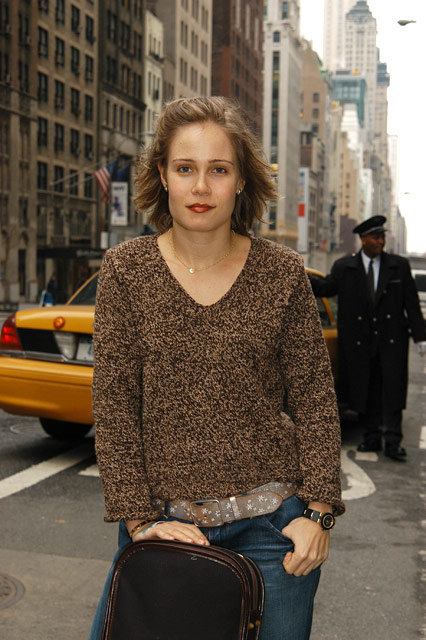
John Adams’ output in the last decade has been wildly uneven but his Scherehazade.2 made seismic impact in its CSO debut, as performed by dedicatee Leila Josefowicz. This 48-minute violin concerto–a contemporary feminist retooling of the 101 Nights–offers Adams’ finest achievement in years, combining searching lyricism with barn-burning bravura. Josefowicz tackled all the difficulties with staggering virtuosity, seeming to embody the program’s protagonist as much as performing the music. It’s amazing what a gifted composer can accomplish when Peter Sellars is nowhere in the vicinity.
Chicago heard several performances of Brahms’s First Piano Concerto in 2017, a work that usually fares less well than the composer’s more lyrical Second Concerto. None were more successful than that given by Nikolai Lugansky in March with Yuri Temirkanov and the St. Petersburg Philharmonic. The Russian pianist had the full measure of this challenging work and rarely has the youthful fire, poetry and sadness of this music come through so powerfully and touchingly.
10. Music of the Baroque. Telemann’s The Day of Judgement.
Jane Glover is often at her best in works that need an extra bit of advocacy. Such was the case again with Telemann’s The Day of Judgement, which closed Music of the Baroque’s season in May. Contra Telemann’s reputation as Handel without the tunes, Glover, some fine soloists and the stellar MOB Chorus and orchestra provided blazing and exuberant advocacy to this odd yet endearing work.
Honorable Mentions
Shostakovich’s Symphony No. 9 from Valery Gergiev and the Mariinsky Orchestra proved revelatory, bringing a weight, cohesion and dark eloquence to a work that usually comes off as less than the sum of its parts. So too Riccardo Muti, Gerard Depardieu and the Chicago Symphony Orchestra and CSO Chorus found more substance than one thought possible in Prokofiev’s Ivan the Terrible, a work cobbled together from two film scores.
Also Lyric Opera’s clever and stylish contemporary retooling of Gluck’s Orphée et Eurydice; Inon Barnatan’s fiery Gershwin with CSO; two great sopranos (Kathryn Lewek and Susanna Phillips) highlighting Mozart’s Mass in C minor with Music of the Baroque; Patricia Racette’s dramatic role debut as Magda Sorel in Chicago Opera Theater’s staging of Gian Carlo Menotti’s The Consul; Arabella Steinbacher’s Berg concerto with CSO; Mendelssohn’s Elijah from Music of the Baroque; cellist Harriet Krijgh, oboist Francois Leleux and pianist Stephen Hough in a soloist-rich summer at the Grant Park Orchestra; Spektral Quartet’s performance of Schoenberg’s String Quartet No. 1; Charles Dutoit’s spiritual program with CSO at Easter including a glowing Durufle Requiem; The Chicago Ensemble’s typically adventurous program of Raff, Copland, Debussy and Prokofiev. Susanna Phillips in Copland’s Ten Poems of Emily Dickinson with Carlos Kalmar and the Grant Park Orchestra; Lyric’s glowingly sung Pearl Fishers; Denis Kozhukhin’s Rachmaninoff with CSO.
______
Igor Levit made a towering local debut in Symphony Center’s piano series in March. He gave a probing, heady reading of Frederic Rzewski’s Dreams, Part 2, and it is hard to imagine his brilliant rendition of Beethoven’s Diabelli Variations being surpassed anytime soon. (Tim Sawyier)
Biggest news story
Unfortunately, it was the revelations of sexual harassment and predatory behavior by James Levine and Charles Dutoit that took place in the Chicago area and elsewhere. Expect only more to come on this front in 2018.
Hello, I must be going
Riccardo Muti led just two weeks of opening concerts this fall before taking the CSO on yet another tour before returning for a single week in November.
Let’s hope that the CSO’s next music director is more focused on bringing interesting, challenging and adventurous programs to Chicago audiences—a conductor who regards local concerts as something more than a chance to brush up standard repertoire for high-profile tours.
Most inexplicable hire
Alex Klein was denied tenure after the trial period of his second round as the CSO’s principal oboe. A better question is: when the orchestra could have their choice of the best oboists in the world, why was a musician with a chronic physiological condition that forced him into early retirement hired back in the first place?
Circular firing squad award
While Lyric Opera’s casting has become more consistent, the company continues to snatch defeat from the jaws of victory with shoddy productions and/or disastrous directional silliness.
With a world-beater cast, what should have been a Die Walküre for the ages at Lyric Opera was fatally undermined by director David Pountney’s lame and interventionist staging–not least turning the “Ride of the Valkyries” into an unfunny, literal bloody mess, half M*A*S*H, half Friday the 13th.
Also a solid cast in Puccini’s Turandot was hobbled by an antediluvian 35-year-old production imported from Miami. Sad!
Most improved programming
After an embarrassing 125th anniversary season bereft of commissions, the CSO has a much more balanced lineup this year with five commissioned premieres and a greater array of American music. CSO still has a long way to go on this front, but let’s see what 2018-19 brings.
Best exhumation
Even with its lame military-march finale, Charles Gounod’s Santa Cecilia Mass contains much wonderful music and received glowing advocacy by Alain Altinoglu leading the Chicago Symphony and CSO Chorus.
Worst opera production of the year
No contest. Lyric Opera’s Carmen was one for the ages and not in a good way. This one had it all—a lowbrow musical theater production, inept stage direction and a grievously miscast singer in the title role. Bizet’s spinning skeleton could be glimpsed emerging from the earth’s crust near Tsingtao.
As a conductor friend put it, “How can you f— up Carmen?”
Worst opera
Despite the volume and press ink that Philip Glass’s 80th birthday season deservedly generated, the composer’s opera The Perfect American proved tedious, depressing and musically bereft in Chicago Opera Theater’s local premiere, with its bizarrely vicious take on Walt Disney as antichrist.
Second worst opera
Former artistic director Andreas Mitisek deserves credit for bringing about COT’s first commission. Too bad Stewart Copeland’s The Invention of Morel was such a noisy, amateurish, musically vacuous turkey.
Best new work
Elizabeth Ogonek’s pensive and intense chamber violin concerto In Silence at MusicNOW in May.
Second best new work
Adam Nieman’s Trio performed at the North Shore Chamber Music Festival in June.
Best programming play
Executive director Amy Iwano for launching a series devoted to the Hungarian modernist composer György Ligeti this season at University of Chicago Presents.
Best emergency debut
Conductor Gemma New for pulling off Richard Strauss’s massive Sinfonia domestica on very short notice in a hugely impressive Grant Park Orchestra debut.
Best opera debut
Rosa Feola’s luminous, heartbreaking Gilda in Lyric Opera’s Rigoletto.
Most valuable player
Matthew Polenzani. The Evanston-born tenor is singing magnificently these days and Chicago audiences were able to hear Polenzani in Magic Flute, Rigoletto and Pearl Fishers at Lyric Opera as well as Haydn’s The Creation at Ravinia.
Outta here
Principal violist Charles Pikler retired from the CSO in October after 39 seasons. Karen Fishman left MOB after 18 distinguished years as executive director.
Andreas Mitisek’s tenure at Chicago Opera Theater was decidedly mixed. But on the positive side no one in Chicago has done more for American opera in such a short span as the Austrian director-conductor. Mitisek’s superb production of Menotti’s underrated The Consul this fall was an apt swan song to the best of his efforts at COT.
Posted in Articles
